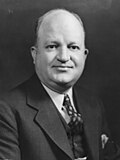| |||||||||||||||||
| |||||||||||||||||
 County results Chapman: 50–60% 60–70% 70–80% 80–90% Cooper: 40–50% 50–60% 60–70% 70–80% 80–90% | |||||||||||||||||
| |||||||||||||||||
| Elections in Kentucky |
|---|
 |
The 1948 United States Senate election in Kentucky took place on November 2, 1948. Incumbent Republican Senator John Sherman Cooper, who won a 1946 special election to fill the vacant seat of Commissioner of Baseball Happy Chandler, ran for a full term in office but was defeated by Democratic U.S. Representative Virgil Chapman.


